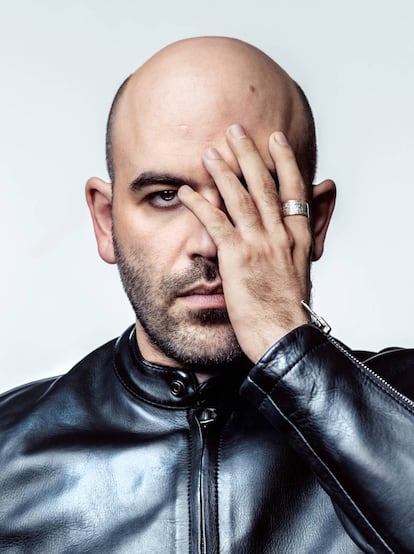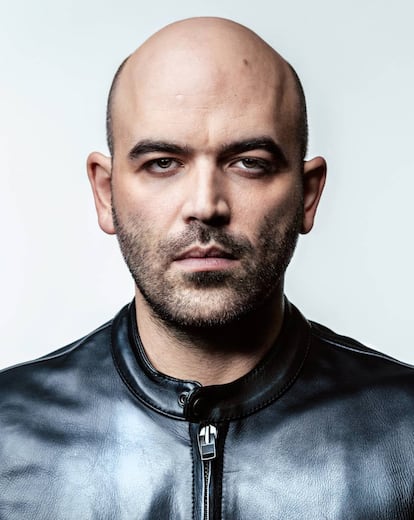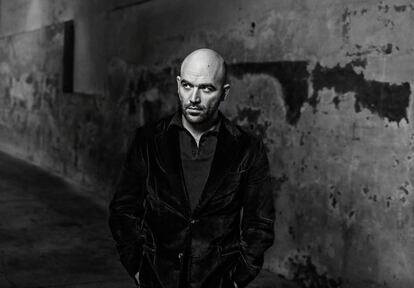Roberto Saviano: “Criminals model themselves after my characters”
Success has condemned the Italian writer to a life of confinement and legions of “haters.” But the man who exposed the Neapolitan Camorra in his book ‘Gomorrah’ continues to take revenge with his pen

In September 2006, a 26-year-old author named Roberto Saviano headed home with a huge, irrepressible grin. He had just bought a red Ducati Monster with the proceeds from his novel Gomorrah. Life, he thought, didn’t get any better than this.
It was a reflection that proved to be right. He never picked up the motorbike from the dealer because it was the last time he would be out alone. Along with international acclaim and financial reward, Gomorrah also brought a chilling death threat from the Neapolitan Mafia bosses it exposed.
It has been 11 years since Saviano received the first threat – 11 years since the characters in his book began weaving themselves into the fabric of his life. As he readily admits, his reclusive existence lends a morbid fascination to his books and his screenwriting. Inadvertently, he has become the stuff of fiction himself, a shadowy figure composing tales of Neapolitan gangland bosses who are easily confused with real-life “capos” who have Saviano on their hit list. At the same time, the Savastanos and Contes and other clans that feed Saviano’s narratives are now walking around the streets of the Naples suburb of Secondigliano as though they had just walked out of the pages of Gomorrah – modeling themselves on the very characters they inspired. That’s how unoriginal real life can be.
Part of Naples is very hostile towards me. There are people who spit on me Roberto Saviano
Plagued with fear, anxiety and regret, Saviano leads a cloak-and-dagger existence. This interview, for example, was meant to take place in a Bologna hotel. But after a short wait, a tall, bald man with a pistol beneath his jacket approaches to say, “Come with me. We’re taking a walk.”
This man heads Saviano’s small army of five armed guards who are waiting by two armored cars. Inside one sits a man in a blue cap and sports jacket with a beard and something of a unibrow, which the Mafia like to make fun of in court. He holds out his hand to introduce himself, as if it were not obvious: “Hello. I’m Roberto.”
Eleven years older than the talented young journalist who rode his Vespa from crime scene to crime scene in Naples, reporting on the violence of the Neapolitan Mafia otherwise known as the Camorra, this other Saviano spends most of his time either in the US or on the international conference circuit. He also gets his message across on TV and radio, sometimes triggering the kind of controversy that threatens to rob him of his state-financed security. He has become a global phenomenon whose stories have won the admiration of Martin Scorsese and Salman Rushdie. He’s a hero applauded by Bono – the champion of good causes – mid-concert. His narrative skills are matched only by his ability to sell his product.

As a TV series based on the book, Gomorrah has been a runaway success and is about to start its third season. It is a format Saviano enjoys, and he aims to write and produce another one about Muammar Gaddafi. The combination of talent and confinement have made him prolific, and his writing is now translated into 30 languages.
His latest book La paranza dei bambini (or The child gang) explores juvenile delinquency in Naples and the shifts among the clans. The Camorra is currently a wounded beast, splintered and undisciplined, killing randomly. Of course, there is already a movie in the pipeline and, who knows, maybe a TV series too.
Saviano talked to EL PAIS about the effect that the Mafia’s ‘fatwa’ has had on his professional and personal life.
How can you write about street violence when you’re in isolation and under armed guard 24/7?
I’ve constructed this novel by attending trials, listening to wiretapped conversations, reading investigative records and interviewing the survivors of the gangs in jail. The first scene, which depicts one of the characters being humiliated, was described to me by a policeman. Nowadays, I’m only allowed out with my boys [he indicates his five bodyguards, to whom he dedicated one of his books]. I can’t go anywhere unnoticed anymore. I’ve lost that. But at the same time I have a lot more access to court records.
It’s a crappy situation. If I make a stand, the mud flies everywhere Roberto Saviano
Do the kids ever break down or express regret during a trial?
No. Some even clap when they hear they’ve been handed a 25-year sentence, as if to say, ‘Who cares? I’m 16 and I’ll be out by the time I’m 26!’ They’re proud to be going to jail. During another investigation, they asked one boy, ‘What do you want to be when you’re older?’ And he said, ‘I’ve never thought about it. I’m going to die in any case.’ It’s hard to imagine this is Europe we’re talking about, because it sounds like something a jihadist would say.
The kids in the suburb of Scampia are starting to wear their hair like the stars of Gomorrah, and the Mafia bosses’ houses look like the home of the Camorra boss in the series. Do you worry you have created a world that might become a reference point for criminals?
It already is. The Camorra mobsters consciously use the same words as my characters. But if you don’t write about these things, it doesn’t mean they’ll stop happening. And if it wasn’t Gomorrah, it would be Scarface or The Godfather. They’re criminals and they see themselves represented in these stories. In Naples, Walter Schiavone modeled his home on Tony Montana’s pad [ in Scarface]. He gave a copy of the movie to the architect so he could see what to do. The strange thing is they have now opened an anti-slander office in Naples which files complaints against people who they consider to have insulted the city.
And you’d be the first on their list.
Yes, but I don’t insult the city. What I do is to describe a problem with a view to it being solved. The fact that delinquents draw inspiration from the series, as happened with Breaking Bad, doesn’t increase their capacity for crime. But I do recognize that I portray the criminal world in such a way that they search for an identity there. For example, if you want to be a mafia boss, you’ll comb your hair like Genny Savastano [from Gomorrah], so that people who don’t know you will immediately get that you’re a tough guy. The problem is that sometimes I read things like: ‘Attack inspired by Gomorrah’ or ‘Robbery Gomorrah-style’ … and that’s not the case. These things were already happening.
When they arrested Chapo Guzmán, they found a signed copy of your book Zero Zero Zero.
Yes. That was problematic. Apparently, it said: ‘For Chapo, with love’. It wasn’t me who signed it, obviously. But an avalanche of criticism came my way, even though my books are read by many Mafia bosses, like Michele Zagaria who had a copy of Gomorrah. They all watch the series.
It looks like we’ve reached the point where fiction and reality are feeding into each other.
Yes, but I always try to explode the mafia myth. I depict the lifestyle and business dealings in detail… I think The Godfather was a classic, but you never actually see how Michael Corleone makes his money. You don’t see him extorting money or setting up casinos. And that’s what makes it fascinating. I have tried to show the machinations to avoid elevating it to mythical status.
It’s certainly true that in the TV series of Gomorrah, it’s impossible to empathize with anyone, even when you start to feel fond of one of the characters.
That was a conscious decision, and something I also did in the film. In the series, for example, when you start to like Immortal because he seems like a likeable sort of villain, he tortures a little girl. I work on the premise that there’s no place for empathy.
The suburb of Scampia is also hostile to your work…
They marched against me! But when the drug-trafficking sons of the Di Lauro clan went back there after being released from jail, there was no demonstration. No one said they weren’t wanted because they had spent 10 years in prison. They only demonstrated against me. There’s even an online protest called ‘Scampiamoci da Saviano.’ I get that they don’t like what I write, but to think I’ve inspired this response is absurd.

Do you go back to Naples once in a while?
Yes, mainly for the trials. But I can’t move about like before. Part of the city is very hostile towards me. There are people who spit on me. They say I’ve made money at the city’s expense. They think the money earned by an honest person from their writing is a problem, but not what the criminals have been doing all these years. I’ve spent 10 years living with this. It’s a very Italian thing. It’s as if the residents of Albuquerque had turned on the writers of Breaking Bad.
You have become a character in the narrative. How do you deal with that?
Recently, I realized that some people thought of me as an unfriendly, sad person – someone only interested in reporting on the Camorra. The hardest thing has been dealing with this image. Having a security detail doesn’t just stop you leading a normal life – one of the reasons I don’t go to the beach, for example, is to avoid the criticism I would get for having a good time on public money.
Have you gotten used to the limitations imposed on you?
Maybe a little. Sometimes I think I’ve learned how to deal with confinement from those sentenced under Article 41 bis [the law applied to members of the Mafia following the murder of Judge Giovanni Falcone]. But I regularly get depressed and don’t want to get out of bed, don’t trust anyone. I start thinking everyone wants to hurt and insult me… I have 2.5 million followers on social networks so you can imagine how many haters I have!
It sounds as though you’re more affected by the criticism and hatred than the actual confinement.
That’s right. You could ask me: ‘Will they kill you?’ And I would say, I don’t know. If I continue to be in the spotlight, it will be very difficult. But it’s worse being discredited. It happened to Judge Falcone: he was ruined by the lifelong attacks on his person. I am trying to learn from that.
You have also been accused of plagiarism.
Yes, there’s an element of ‘we already knew that’ or ‘that’s already been said.’ But my strength doesn’t lie in exclusives or breaking stories, it lies in highlighting what is set out in black and white in the newspapers. I didn’t discover how the Mafia bosses operate; that’s what police investigations are for. I just analyze it in my narrative. And I’ve had to insist on that. In the end, I turned to fiction to avoid having to justify myself anymore.
They think the money earned by an honest person from their writing is a problem, but not what the criminals have been doing all these years
Roberto Saviano
You have started to focus a lot on children – with this recent novel, talks in schools and campaigns against bullying. I wonder if that’s because, despite your lifestyle, you are thinking of having children yourself.
The idea makes me anxious. I’m terrified that the people I love should have to live like me. My mother had a heart attack and I felt I was to blame. I came as fast as I could from the US, partly because I felt I had punched her in the heart myself. For 10 years I have made her move around so many times but without the benefits I have had: the success, the interviews, and the work that I enjoy. For her, it’s only brought problems. The same with my brother, whom I love like crazy. He says he supports me, but I know he is tired of putting up with things as they are.
Has he said so?
He is too proud to do that. But my mother says more, partly because I have ruined her life. My friends also pay a price and that’s very painful. When I say something, they are asked to comment on it. It’s very unfair and I don’t know if it’s even normal. E-mails, texts… How do you cope with the idea that people you approach have to share your fate? It’s a crappy situation. If I make a stand, the mud gets sprayed everywhere.
Some might say your confinement has worked in your favor commercially.
I know. They also told Salman Rushdie that he should lay flowers at Khomeini’s grave for turning him into the world’s most famous author. And it’s true that there is a positive side… But the truth is, by the time I was getting threats, I’d already sold 100,000 copies [of Gomorrah]. My mother still says, ‘Roberto, you were not walking, you were flying.’ I was already a published writer. I had achieved what I wanted. When I was threatened, everything got bigger. But I already had a second contract and I was buying a motorbike… If I could go back in time, I would return to that September.

Would you change anything you’ve done since being threatened?
Yes. I would be much more careful and I wouldn’t have done Gomorrah in the same way. I challenged them because I felt invincible. I was leading a real intellectual life, not this shitty rootless clandestine existence. I’m spending tonight with them [he points to the bodyguards]. I also feel enormously guilty for ruining the lives of people I really love. But I was 26, I was very young and I thought nothing would ever happen to me. In the end they have broken me… though I’m still here.
How do you deal with the guilt?
It really gets to me and I feel as though I don’t deserve to be happy. My choices have determined the lives of those around me. My brother lived a quiet life before all this… [the whole family moved to the north of Italy]. I have two recurring dreams. In one, I’m in a windowless room with only a tiny hole to come in or out of. In the other, I meet my mother and brother and they don’t recognize me.
So why don’t you stop writing about Naples?
The further away I get, the more I write about it. Distance makes the heart grow fonder and also increases the capacity for thought and analysis. Getting away from it is a way of staying there. It’s my turf, I know it front to back and I miss it. That’s why it seems such a disgrace that I should be labeled an enemy of the city. Every time I sign a contract, I type ‘house for sale in Naples’ in Google. Then I call the bank to ask for a mortgage and they say, ‘You really mean Naples?’ So I hang up and don’t call again.
English version by Heather Galloway.
